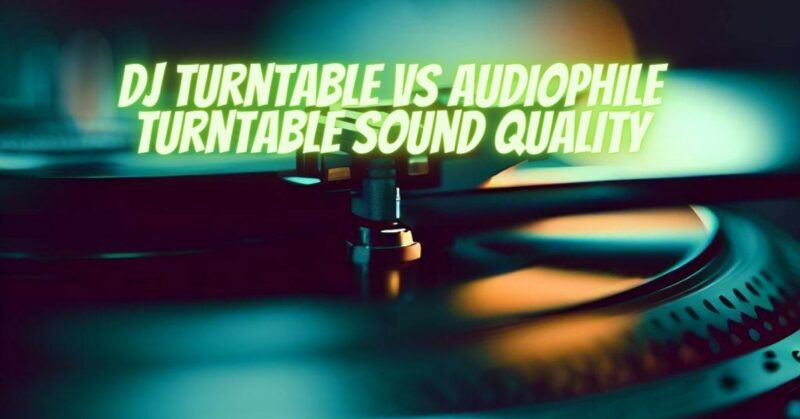Turntables have become synonymous with both the art of DJing and the pursuit of high-fidelity audio reproduction. However, the requirements for these two distinct purposes can lead to variations in design, features, and ultimately, sound quality. In this article, we delve into the differences between DJ turntables and audiophile turntables when it comes to sound quality, helping you understand the unique qualities each brings to the table.
DJ Turntable Sound Quality:
- Focused on Performance: DJ turntables are designed to withstand the rigors of live performances, emphasizing features such as rapid start-up times, precise pitch control, and durable construction. Sound quality remains important, but it’s often balanced with the need for practicality and reliability.
- High Torque Motors: DJ turntables are equipped with high torque motors that facilitate quick start and stop times, essential for beatmatching, scratching, and cueing. While these motors provide power, they can introduce some motor noise, potentially affecting overall sound quality.
- Stylus and Cartridge Choices: DJ cartridges are optimized for tracking ability and durability, allowing DJs to perform scratching and back-cueing without causing excessive wear on the records. While they might not offer the same level of fidelity as audiophile cartridges, they excel in the specific demands of DJing.
- Sound Profile: DJ turntables prioritize dynamic range and a punchy sound signature. This profile complements the energetic and bass-heavy tracks often played in clubs and live settings, providing impact and excitement.
Audiophile Turntable Sound Quality:
- Pursuit of Fidelity: Audiophile turntables are meticulously engineered to reproduce sound as faithfully as possible, emphasizing tonal accuracy, detail retrieval, and minimal distortion. Sound quality is the paramount concern.
- Precision Components: Audiophile turntables use high-quality components such as tonearms, cartridges, and platter materials that minimize resonance and vibration. These components contribute to a more accurate and transparent sound.
- Playback Stability: Audiophile turntables prioritize consistent playback speed to ensure that the original recording’s nuances are preserved. Stable rotation contributes to a smoother listening experience.
- Sound Profile: Audiophile turntables aim for a neutral and balanced sound profile, reproducing recordings with utmost accuracy and providing a platform for the listener to experience the nuances of the music.
Comparing Sound Quality:
- Dynamic Range and Energy: DJ turntables excel in reproducing dynamic tracks with energy and impact, which suits the high-energy atmosphere of clubs and live DJ sets.
- Fidelity and Nuance: Audiophile turntables prioritize accurate sound reproduction, making them ideal for enthusiasts who want to experience the finest details of their vinyl records.
- Context Matters: The choice between a DJ turntable and an audiophile turntable largely depends on the context. While a DJ turntable might excel in a live performance setting, an audiophile turntable shines in an environment dedicated to critical listening.
The distinction between DJ turntables and audiophile turntables extends to their sound quality characteristics. DJ turntables emphasize performance, durability, and a dynamic sound profile suited for live performances. Audiophile turntables prioritize sound fidelity, accuracy, and a balanced sound signature that faithfully reproduces the original recordings. Ultimately, the choice between the two depends on your intended use: whether you’re seeking to create energetic live sets or to delve into the intricate nuances of your favorite music.


